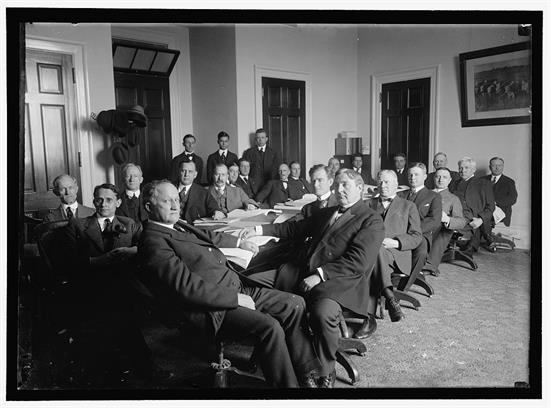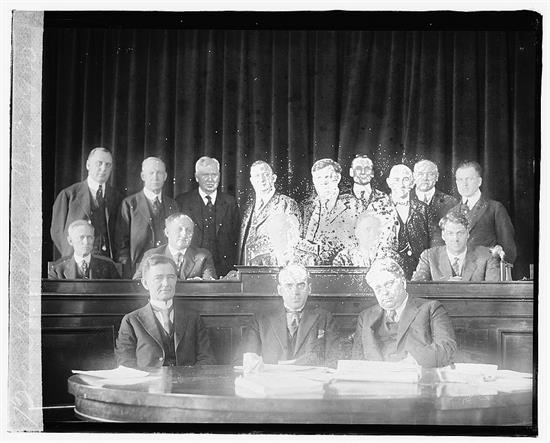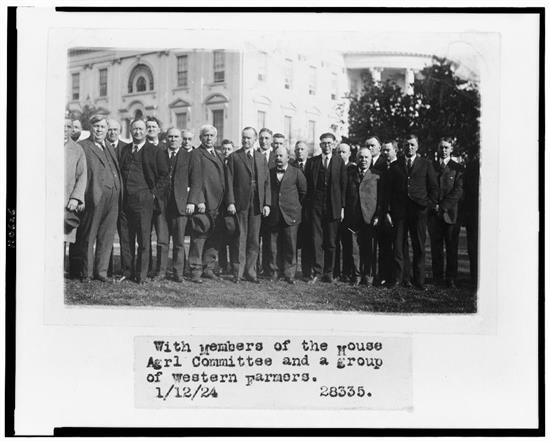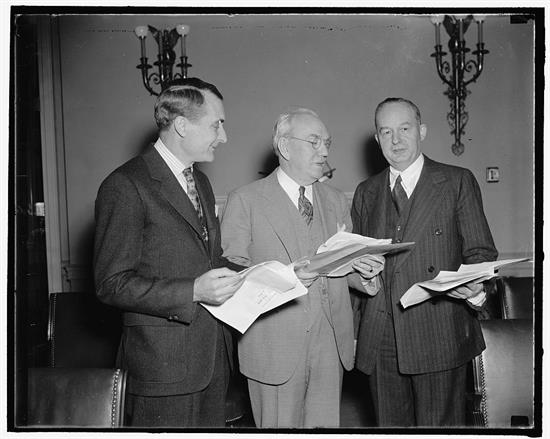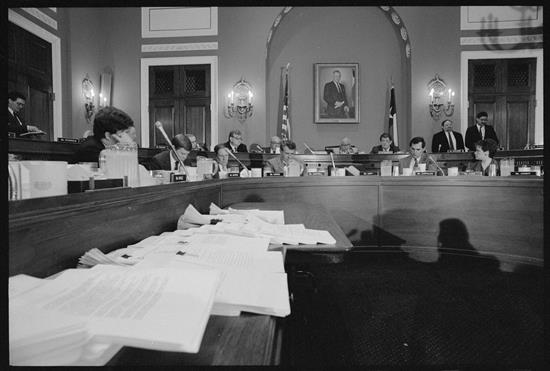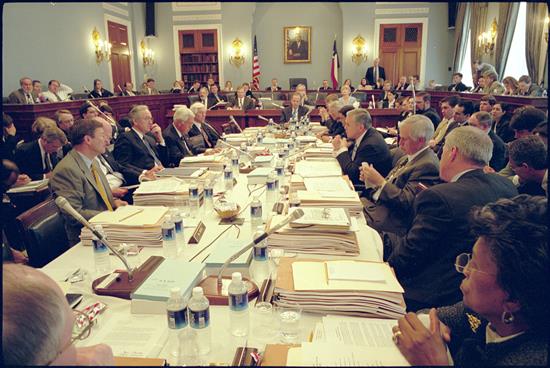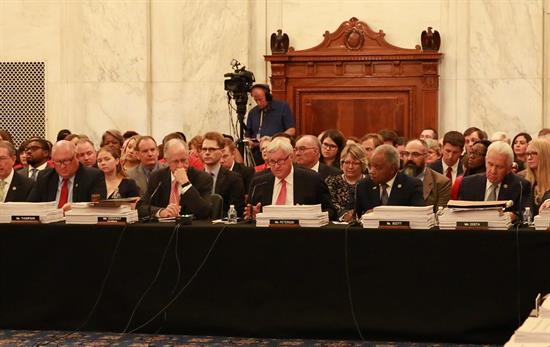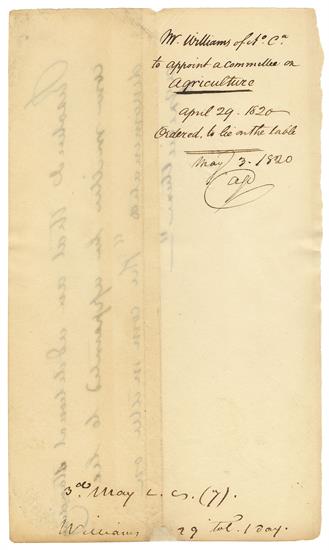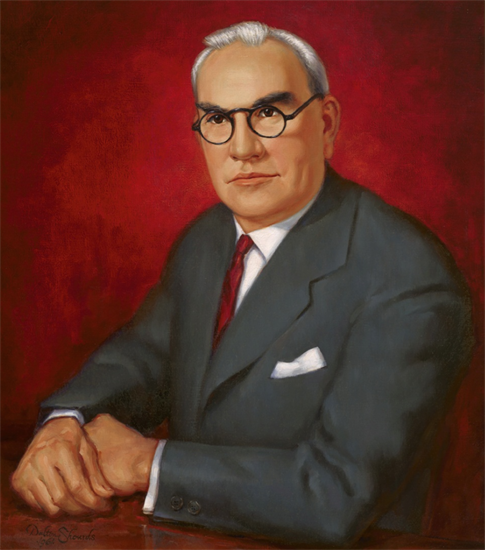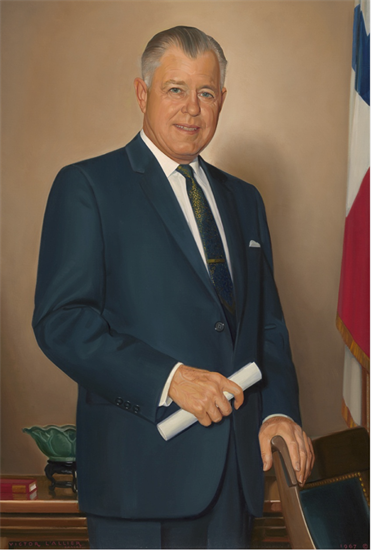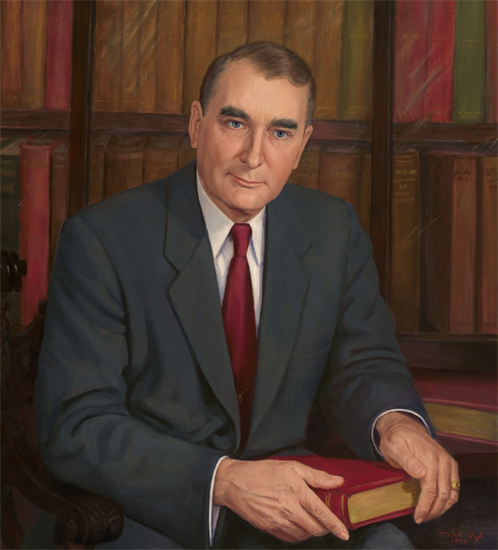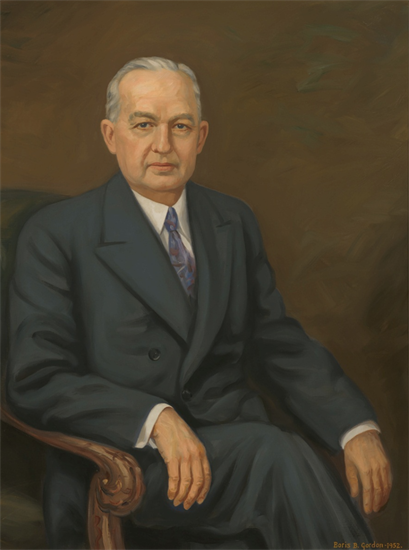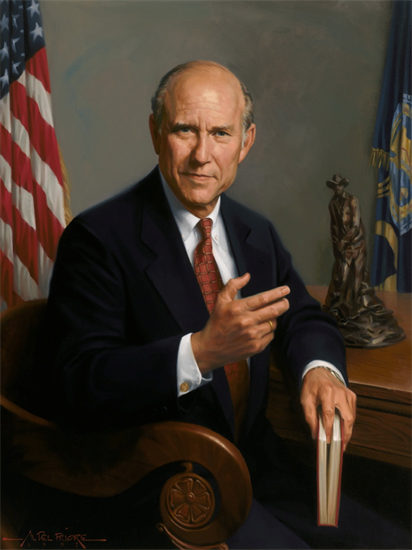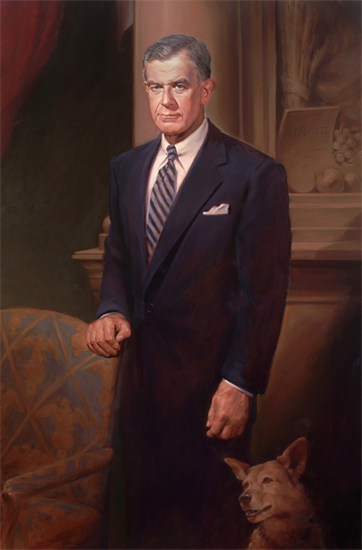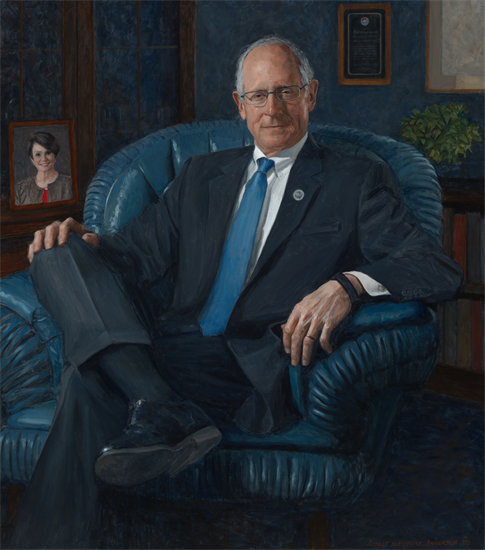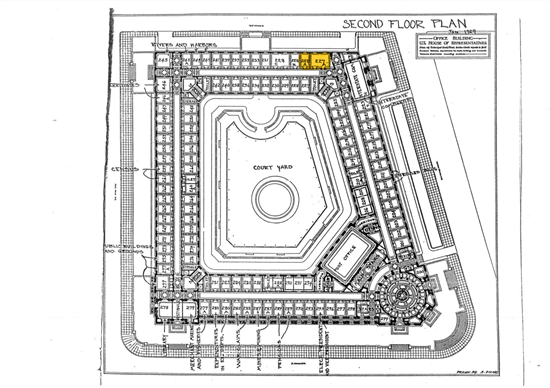
“We are proud to commemorate 200 years of accomplishments and history of the United States House Committee on Agriculture. While we were unable to celebrate in 2020 due to the global pandemic, we are pleased to finally be able to acknowledge this milestone and share with the public all the work the Committee has accomplished over the past two centuries. We hope you will join us in celebration and that this virtual tour will give you a glimpse into the great legacy that the House Agriculture Committee continues to leave.” – Chairman David Scott and Ranking Member Glenn “GT” Thompson
Upon the House Committee on Agriculture’s 200th Anniversary, then Chairman Collin Peterson and then Ranking Member K. Michael Conaway reflected on the Committee’s work and history in a statement on April 29, 2020.
"For 200 years, the House Agriculture Committee has brought the issues facing farmers and ranchers and the rural communities they call home together with the needs of consumers in the city, to make sure all Americans have food, fiber, and fuel. The work we do has seen us through challenges on the farm and in our nation more broadly, ranging from the Civil War and Reconstruction, to two World Wars, the Great Depression and the Dust Bowl, the farm crisis in the 1980s, and now to our current challenge with this pandemic. We've never shied away from the tough tasks before us, and we won't start now. Americans need policy that ensures their food is available and their communities are strong. That was our job 200 years ago, and it's still our job today", said Peterson.
"Today marks 200 years of service from the House Agriculture Committee to America's farmers and ranchers, who have dedicated themselves to this country for far longer," said Conaway. "American agriculture has kept this nation fed and clothed through many difficult times in our history, including the global health pandemic we are currently facing. Now more than ever, we are reminded of the important role these hardworking individuals play in our daily lives, and our duty to stand with them as Members of the House Agriculture Committee."
Media
Gallery
Scroll through the media gallery to watch archived videos from the Agriculture Committee.

Committee
History
The House Committee on Agriculture was created on May 3, 1820, after Lewis Williams of North Carolina sponsored a resolution to create the Committee which gave agricultural issues equal weight with commercial and manufacturing interests. The Committee originally consisted of seven members, from the states of Maryland, New Hampshire, New York, Pennsylvania, South Carolina, Vermont, and Virginia. Thomas Forrest of Pennsylvania was the first chairman. The Agriculture Committee remained a seven-member body until 1835 when two more members were added. It was not until 1871 that the next two members were added. Since then, it has gradually grown to its current size of 51 members.
Read full historyCommittee History
On motion of Mr. Williams of North Carolina, the House took up and proceeded to consider the resolution submitted by him on the 29th ultimo, for the appointment of a standing committee to be denominated “The Committee on Agriculture”; and the resolution was agreed to by the House, and ordered that the committee consist of seven members.1
Thus, the Committee on Agriculture was created on May 3, 1820. The population of the country was about nine million and there were 213 Representatives in the House. Seven of these Representatives, under the chairmanship of Thomas Forrest, of Pennsylvania, were assigned to the new committee. Six other states were represented in this group: Maryland, New Hampshire, New York, South Carolina, Vermont, and Virginia. (The Senate Committee on Agriculture, Nutrition, and Forestry was founded on December 9, 1825.)
Lewis Williams, a Representative from Surrey County, North Carolina, elected to the 14th and 13 succeeding Congresses, and known as the "Father of the House," was the sponsor of the resolution proposing a Committee on Agriculture, and at the time of its introduction, April 29, 1820, he had this to say on the floor of the House:
Gentlemen, say that there are, in this country, three interests, the agricultural, commercial, and manufacturing. And how happens it, sir, that the agricultural, the great leading and substantial interest in this country, has no committee; no organized tribunal in this House to hear and determine on their grievances? If the commercial or manufacturing interests are affected, the cry resounds throughout the country; remonstrances flow in upon us; they are referred to committees appointed for the purpose of guarding them, and adequate remedies are provided. But, sir, when agriculture is oppressed, and makes complaint, what tribunal is in this House to hear and determine on the grievances?2
While originally consisting of seven Members, the committee gradually increased in size. In 1835, the 23rd Congress increased the membership to nine, and then not until the 42nd Congress, in 1871, was it again increased, this time to 11. From then on there was a steady increase until the maximum was reached in the 107th Congress, 2001, when 51 Members were assigned to the committee and its five subcommittees.
Presently, the Committee, chaired by the Honorable David Scott, a Democrat representing the 13th District of Georgia, consists of 51 Members – 27 Democrats and 24 Republicans.
The Honorable Harold D. Cooley, a Democrat from North Carolina, served eight terms as Chairman (1949-1953 & 1955-1976), longer than any previous head of the Committee. Other Chairmen who served for long periods include James W. Wadsworth (New York) and Gilbert N. Haugen (Iowa), both Republicans, who served for six terms each. Marvin Jones, a Texas Democrat, and William H. Hatch, a Missouri Democrat, each served as Chairman for five terms. Edmund Deberry, a North Carolina Whig, served for four terms.
The jurisdiction of the Committee, as originally defined, covered simply "subjects relating to agriculture." In the revision of the rules of the House in 1880, the Committee on Rules proposed the same simple rule: "subjects relating to agriculture: to the Committee on Agriculture." However, during consideration by the House, the words "and forestry" were inserted on motion of Mark H. Dunnell, of Minnesota, who said that bills relating to tree culture had formerly gone to the Public Lands Committee, but more recently had gone to the Agriculture Committee. Thus, the broad field of forestry was included in the Committee's jurisdiction. More important was an amendment by D. Wyatt Aiken, of South Carolina, adding these words to the description of the Committee's jurisdiction: "who shall receive the estimates and report the appropriations for the Agricultural Department." Although there existed an Appropriations Committee, the Committee on Agriculture reported on Department of Agriculture appropriations from 1880 until July 1, 1920, when another revision of the rules of the House returned to the Appropriations Committee all jurisdiction over appropriations.
The Committee has, by direct action of the House, secured jurisdiction over agriculturally related subjects. Thus, the Committee assumed jurisdiction for farm credit when the House referred to it the President's message dealing with the refinancing of farm-mortgage indebtedness on April 4, 1933, 73rd Congress.
The jurisdiction as presently defined in the Rules of the House of Representatives was made effective January 2, 1947, as a part of the Legislative Reorganization Act of 1946, and is as follows:
1. Adulteration of seeds, insect pests, and protection of birds and animals in forest reserves.
2. Agriculture generally.
3. Agricultural and industrial chemistry.
4. Agricultural colleges and experiment stations.
5. Agricultural economics and research.
6. Agricultural education extension services.
7. Agricultural production and marketing and stabilization of prices of agricultural products, and commodities (not including distribution outside of the United States).
8. Animal industry and diseases of animals.
9. Commodity exchanges.
10. Crop insurance and soil conservation.
11. Dairy industry.
12. Entomology and plant quarantine.
13. Extension of farm credit and farm security.
14. Inspection of livestock, poultry, meat products, and seafood and seafood products.
15. Forestry in general, and forest reserves other than those created from the public domain.
16. Human nutrition and home economics.
17. Plant industry, soils, and agricultural engineering.
18. Rural electrification.
19. Rural development.
20. Water conservation related to activities of the Department of Agriculture.
In carrying out its responsibilities, the Committee conducts hearings, some public and some in executive session, to consider various legislative proposals. It affords the general public the opportunity to express its views. Among the witnesses are representatives of farm organizations, consumer groups, and ordinary citizens. The sessions are held to perfect the details of the legislation. As the role of the farmer becomes more technical and industrialized, so will the role of this committee become more complex.
One of the very important functions of any committee is the reporting of legislation to the House. Designed to fully explain each piece of legislation approved by the Committee, a "report" takes the form of a formal printed document and accompanies a bill as it goes to the House Floor for action. It is also a reflection of the Committee's interests. In recent Congresses, the reports of the Committee on Agriculture generally fill one volume of a few hundred pages. By comparison, all of the reports from the Agriculture Committee from the 16th to the 49th Congresses are bound in one volume.3
Of course, there have been many momentous and historical reports on legislation by the Committee which have had a profound and lasting effect on the agricultural community and the Nation. The first reference to a Department of Agriculture was in "Ho. of Reps. Rep. No. 595," April 12, 1842:
The Committee on Agriculture, to which was referred the petition of Joseph L. Smith and others, praying for the establishment of a department of agriculture and education, have had the same under consideration, and beg leave to report the following resolution: Resolved. That it is inexpedient to grant the prayer of petitioners.
Proposals for a Department of Agriculture were made many times and in House Report 321 of August 5, 1856, the Committee had this to say:
Agriculture is the basis of our national prosperity. It is the substratum of all other interests; and the degree of advancement which marks the progress of our country and its people in wealth, enterprise, education, and substantial independence, is measured by the prosperity of its rural interests. It is one of those arts which, from the earliest periods, have been deservedly held in the highest estimation. One of the first injunctions upon our original progenitor, after his expulsion from the Garden of Eden, was that he should "till the soil."
It was not until 1862 that a favorable report was acted on, which led to the establishment of the U.S. Department of Agriculture on May 15, 1862. But it was not of Cabinet rank. The first Commissioner of Agriculture was Isaac Newton, who inherited the staff of nine employees and facilities of the Agricultural Division of the Patent Office. The embryo department, a year later, had a horticulturist, a chemist, an entomologist, a statistician, an editor, and 24 others. Experimental work was done in a propagating garden bounded by what is now Madison and Adams Drives, and Fourth and Sixth Streets. When no longer needed by the Union Army for a cattle yard, a larger area between Independence and Constitution Avenues, and 12th and 14th Streets was transferred to the Department. The appropriation for the first year was $80,000.
Although many urged that the Department be an executive department with a secretary who would be a member of the President's Cabinet, it was 27 years before Congress elevated it to Cabinet status in 1889. At this time, the Department consisted of 488 employees and had an annual appropriation of $1.1 million.
When the Committee was established in 1820, the Nation was in its infancy. The population was 9,618,000, having more than doubled from the first census taken in 1790. By 1862, when the Department of Agriculture was founded, the population was up to 33 million. It had reached almost 107 million in 1920 when the committee marked its centennial, and the Census Bureau estimate for May of 2004 is over 300 million.
So, with a glance back at the growth of the United States, and a look ahead at the continued growth of both our domestic and the global population, it becomes unmistakably clear that nothing is more important to the welfare of Americans than the maintenance of a healthy agriculture industry, which is the continuing prime objective of the Committee.
Notes:
1. From the Debates and Proceedings in the Congress of the United States," 16th Cong., 1st sess., May 3, 1820.
2. From "Annals of the Congress of the United States," 16th Cong., 1st sess., Saturday, Apr. 29, 1820.
3. Reports of the Committee on Agriculture from the organization of the committee May 3, 1820, to the close of the 49th Congress, 1887, inclusive. Compiled. under the direction of the Joint Committee on Printing, by T. H. McKee, clerk, document room, U.S. Senate.

Former
Chairs
Chairs Since 1820
The United States House of Representatives Committee on Agriculture was created on May 3, 1820. In 200 years of the Committee’s history, it has seen 48 different chairmen who have represented 26 different states. Four Chairmen have served two separate times, and five have served for ten years or more.
Read full biosChairs Since 1820
Chairs Since 1820
The United States House of Representatives Committee on Agriculture was created on May 3, 1820. In 200 years of the Committee’s history, it has seen 48 different chairmen who have represented 26 different states. Four Chairmen have served two separate times, and five have served for ten years or more.
Rep. Thomas Forrest – 1820-1821
Federalist – PennsylvaniaRepresentative Thomas Forrest was the first Chairman of the House Committee on Agriculture. He served as Chairman from the Committee’s establishment in 1820 until the following year, 1821. At the time, he was only one of seven representatives serving on the Committee, and at the time, 79% of the American labor force worked in Agriculture. Important legislation passed during Forrest’s tenure as Chairman included The Land Act of 1820 and the Relief Act of 1821. He represented the 1st Congressional District of Pennsylvania.
Rep. Josiah Butler – 1821-1823
Democratic-Republican – New HampshireRepresentative Josiah Butler, Chairman of the House Committee on Agriculture during the Seventeenth Congress, served as one of six Members who represented the state of New Hampshire at-large. He graduated from Harvard University in 1803, taught, practiced law, served as a sheriff, and served as a clerk for the court of common pleas before serving in the State House of Representatives and eventually the United States Congress. Butler represented New Hampshire as an At-large Representative.
Rep. Stephen Van Rensselaer – 1823-1829
National Republican – New YorkRepresentative Stephen Van Rensselaer was a New York politician, militia officer, landowner, and businessman. A Harvard graduate, Van Rensselaer served in the New York State Assembly and State Senate before serving in Congress. He was the Chairman of the House Committee on Agriculture during the Eighteenth, Nineteenth, and Twentieth Congresses. In 1825, Van Rensselaer cast the vote that possibly decided the presidential election in favor of John Quincy Adams. Van Rensselaer is also the 10th richest American of all time, based on the ratio of his fortune to contemporary GDP. During his time as Chairman, the United States Senate Committee on Agriculture, Nutrition, and Forestry was established (1825). Van Rensselaer represented the 9th and 10th Congressional Districts of New York.
Rep. Ambrose Spencer – 1829-1831
National Republican – New YorkRepresentative Ambrose Spencer was a lawyer and politician who studied at Yale and Harvard. He served the state of New York in several capacities, including being a member of the State Assembly, State Senate, Assistant Attorney General, and Attorney General. Spencer served as the Chairman of the House Committee on Agriculture during the Twenty-first Congress. He represented New York’s 10th Congressional District.
Rep. Erastus Root – 1831-1833
Democrat – New YorkRepresentative Erastus Root was born in Hebron, Connecticut, and graduated from Dartmouth College. He served in Congress several times throughout his life, including the Eighth, Eleventh, Fourteenth, and Twenty-second Congresses. He served as the Chairman for the House Committee on Agriculture during the Twenty-second Congress. In addition to practicing law, he earned a medical degree from Dartmouth and served as a Major General in the US Army. He spent a total of 30 years in elected office. Root represented the 8th, 11th, 12th, and 14th Congressional Districts of New York.
Rep. Abraham Bockee – 1833-1837
Democrat – New YorkRepresentative Abraham Bockee graduated from Union College in Schenectady, New York, and studied law in Poughkeepsie, where he practiced. He spent time serving in the New York State Legislature after his terms in Congress. He was a member of the Twenty-first, Twenty-third, and Twenty-fourth Congresses, where he served as Chairman of the House Committee on Agriculture during the Twenty-third and Twenty-fourth Congresses. Bockee represented New York’s 5th Congressional District.
Rep. Edmund Deberry – 1837-1845
Whig – North CarolinaRepresentative Edmund Deberry was born in Lawrenceville (now Mount Gilead), North Carolina. He was an agriculturalist who engaged in the operation of cotton mills and flour mills. He was a member of the North Carolina State Senate for a combined total of eleven years and as Justice of the Peace. Deberry was elected to serve in the Twenty-first, Twenty-third, Twenty-fourth, Twenty-fifth, Twenty-sixth, Twenty-seventh, Twenty-eighth, and Thirty-first Congresses. Deberry served as the Chairman of the House Committee on Agriculture for the Twenty-fifth through Twenty-eighth Congresses. He represented North Carolina’s 3rd, 4th, and 7th Congressional Districts during his time in office.
Rep. Joseph H. Anderson – 1845-1847
Democrat – New YorkRepresentative Joseph Anderson was born in Harrison, New York, and served as a member of the New York State Assembly for two years and as Sheriff of Westchester County, NY, for three. He was an agriculturalist who was elected to serve in the Twenty-eighth and Twenty-ninth Congresses. He served as Chairman of the House Committee on Agriculture during the Twenty-ninth Congress. After serving in Congress, he was not a candidate for re-nomination and returned to New York to farm. Anderson represented the 7th Congressional District of New York.
Rep. Hugh White – 1847-1849
Whig – New YorkRepresentative Hugh White was born in Whitestown, New York, and attended Hamilton College. He studied law but turned his efforts toward business. He established a cement business with his brother and took advantage of the construction of waterpower and transportation facilities. He was elected to serve in the Twenty-ninth, Thirtieth, and Thirty-first Congresses, where he was the Chairman of the House Committee on Agriculture during the Thirtieth Congress. White served the 16th Congressional District of New York.
Rep. Nathaniel S. Littlefield – 1849-1851
Democrat – MaineRepresentative Nathaniel S. Littlefield was born in Wells, Maine, and practiced law in Bridgton. He held local office before being appointed Secretary of the Maine State Senate. Later he served as the Senate’s President Pro Tempore. Littlefield served in the Thirty-first Congress and served as the Chairman of the House Committee on Agriculture for his two-year term. He represented Maine’s 2nd and 5th Congressional District.
Rep. John G. Floyd – 1851-1853
Democrat – New YorkRepresentative John G. Floyd was born in Mastic, New York. He graduated from Hamilton University and practiced law in Utica. He worked as a clerk and prosecuting attorney for four years and was appointed Judge of Suffolk County. Floyd served three terms in the United States House of Representatives with a break before his final term, where he was a member of the New York State Senate. He served in the Twenty-sixth, Twenty-seventh, and Thirty-second Congresses and was Chairman of the House Committee on Agriculture during the Thirty-second Congress. Floyd represented the 1st and 17th Congressional Districts of New York.
Rep. John L. Dawson – 1853-1855
Democrat – PennsylvaniaRepresentative John L. Dawson was born in Uniontown, Pennsylvania, and graduated from Washington College. He ran a small law practice and served as Deputy Attorney for Fayette County, Pennsylvania, and as the District Attorney for the western district of Pennsylvania. He served in the Thirty-second, Thirty-third, Thirty-eighth, and Thirty-ninth Congresses, serving as the Chairman of the House Committee on Agriculture during the Thirty-third Congress. Dawson was appointed the Governorship of the Kansas Territory by President Pierce, but he declined the office to run for Congress again. He represented the 18th, 20th, and 21st Congressional Districts of Pennsylvania throughout his terms.
Rep. David P. Holloway – 1855-1857
Opposition – IndianaRepresentative David P. Holloway was born in Waynesville, Ohio. He learned the printing business and served four years in the office of the Cincinnati Gazette. He moved to Richmond, Indiana in 1823 and was the owner and proprietor of the Richmond Palladium until he died. Holloway served in both chambers of the Indiana State Legislature. He served in the Thirty-fourth Congress, where he was Chairman of the House Committee on Agriculture. He represented Indiana’s 5th Congressional District. Representative Holloway was a patent attorney for the rest of his career in Washington, D.C. He represented Indiana's 5th Congressional District.
Rep. William G. Whiteley – 1857-1859
Democrat – DelawareRepresentative William G. Whiteley was born in Newark, Delaware, attended Bullock’s School at Wilmington, and graduated from Princeton College in 1838. He studied and practiced law. Whiteley was a member of the Thirty-fifth and Thirty-sixth Congresses, where he was Chairman of the House Committee on Agriculture during the Thirty-Fifth Congress. After Congress, he served in a wide variety of roles including the Mayor of Wilmington, Delaware, and Census Enumerator for Delaware. Whitely represented the state of Delaware as an At-large Representative.
Rep. Martin Butterfield – 1859-1861
Republican – New YorkRepresentative Martin Butterfield was born in Westmoreland, New Hampshire. After attending school, he moved to Palmyra, New York, where he engaged in the hardware business and in the manufacturing of rope and cordage. He was a member of the Thirty-sixth Congress, where he served as the Chairman of the House Committee on Agriculture. Butterfield represented the 25th Congressional District of New York.
Rep. Owen Lovejoy – 1861-1863
Republican – IllinoisRepresentative Owen Lovejoy was born in Albion, Maine, and graduated from Bowdoin College. He studied law and theology, moved to Illinois, and was an ordained pastor of the Congregational Church in Princeton. He served as a member of the State House of Representatives and later served in the Thirty-fifth, Thirty-sixth, Thirty-seventh, and Thirty-eighth Congresses. He served as Chairman of the House Committee on Agriculture during the Thirty-seventh Congress. During his time as Chairman, the Morrill Act of 1862 was passed, which initiated the land-grant college system. Lovejoy represented the 3rd and 5th Congressional Districts of Illinois.
Rep. Brutus J. Clay – 1863-1865
Union – KentuckyRepresentative Brutus J. Clay was born in Richmond, Kentucky, and graduated from Centre College. An agriculturalist, Clay raised livestock and served in the State House of Representatives. He also was President of the Bourbon County Agricultural Association and the Kentucky Agricultural Association. He served in the Thirty-eighth Congress, where he was Chairman of the House Committee on Agriculture. Clay was a Unionist during the Civil War. He served the 7th Congressional District of Kentucky.
Rep. John Bidwell – 1865-1867
Republican – CaliforniaJohn Bidwell was born in Chautauqua County, New York, and moved to Pennsylvania, Ohio, and Missouri before settling in the Sacramento Valley, California. He worked on a ranch and mined before serving in the War with Mexico, where he attained the rank of Major. He was a member of the State Senate, Supervisor in California of the United States Census, and Delegate to both the Democratic National Convention in 1860 and the Republican National Convention in 1864. He served in the 39th Congress, where he was Chairman of the House Committee on Agriculture. He ran for Governor of California in 1875 and 1890 and ran for President in 1892. Bidwell served the 3rd Congressional District of California.
Rep. Rowland E. Trowbridge – 1867-1869
Republican – MichiganRepresentative Rowland E. Trowbridge was born in Horseheads, New York, and moved with his family to Michigan before graduating college at Kenyon College in Ohio. He was an agriculturalist who was a member of the State Senate for four years. He served in the Thirty-seventh, Thirty-ninth, and Fortieth Congresses. He was the Chairman of the House Committee on Agriculture during the Fortieth Congress. Trowbridge represented the 4th and 5th Congressional Districts of Michigan before returning to farming after serving in Congress.
Rep. John Thomas Wilson – 1869-1873
Republican – OhioRepresentative John Thomas Wilson was born in Bell, Ohio, and worked in the mercantile and agriculture industries. He was appointed the First Lieutenant of Company E, Seventieth Regiment, Ohio Volunteer Infantry during the Civil War, and was discharged as a Captain. Wilson served as a State Senator before being elected to serve in the Fortieth, Forty-first, and Forty-second Congresses. He was Chairman of the House Committee on Agriculture for the Forty-first and Forty-second Congresses. He represented the 11th Congressional District of Ohio.
Rep. Charles Hays – 1873-1875
Republican – AlabamaRepresentative Charles Hays was born at “Hays Mount,” near Boligee, Alabama, and graduated from the University of Georgia and the University of Virginia. He was a cotton farmer, a Delegate to the Democratic National Convention in 1860, a Major in the Confederate Army during the Civil War, a member of the Constitutional Convention of Alabama in 1867, and a State Senator in 1868. He served in the Forty-first, Forty-second, Forty-third, and Forty-fourth Congresses and served as the Chairman of the House Committee on Agriculture during the Forty-third Congress. He served the 4th Congressional District of Alabama.
Rep. John Henry Caldwell – 1875-1877
Democrat – AlabamaRepresentative John Henry Caldwell was born in Huntsville, Alabama, and graduated from Bacon College in Kentucky. Caldwell was a schoolteacher, principal, Editor of the Jacksonville Republican, member of the State House of Representatives, and a lawyer in Jacksonville, Alabama, before enlisting in the Confederate Army and serving throughout the Civil War. He served in the Forty-third and Forty-fourth Congresses and was the Chairman of the House Committee on Agriculture during the Forty-fourth Congress. He served the 5th Congressional District of Alabama.
Rep. Augustus W. Cutler – 1877-1879
Democrat – New JerseyRepresentative Augustus W. Cutler was born in Morristown, New Jersey, grew up on a farm, and graduated from Yale College after studying law. He practiced in Morristown, served as Prosecutor of the Pleas for Morris County, was President of the Board of Education, a member of the State Senate, and a Delegate to the State Constitutional Convention in 1873. He served in the Forty-fourth and Forty-fifth Congresses and was the Chairman of the House Committee on Agriculture during the Forty-fifth Congress. He served the 5th Congressional District of New Jersey.
Rep. James W. Covert – 1879-1881
Democrat – New YorkRepresentative James W. Covert was born at Oyster Bay, New York. He studied law and practiced in Flushing, New York. Also, he was the District School Commissioner and Assistant Prosecuting Attorney of Queens County. Covert served in the Forty-fifth, Forty-sixth, Fifty-first, Fifty-second, and Fifty-third Congresses. He served as Chairman of the House Committee on Agriculture during the Forty-sixth Congress. Between his terms in Congress, he served in the State Senate. Covert served the 1st Congressional District of New York.
Rep. Edward K. Valentine – 1881-1883
Republican – NebraskaRepresentative Edward K. Valentine was born in Keosauqua, Iowa. Valentine learned the trade of a printer but served his country in many capacities. During the Civil War, he enlisted in the Union Army and served in the Sixty-seventh Regiment, was a member of the Illinois Volunteer Infantry, and was eventually promoted to Second Lieutenant and honorably discharged. Several years later, he reenlisted as a private in the Seventh Iowa Volunteer Cavalry and was promoted to Adjutant of the Regiment. He studied law and practiced in West Point, Nebraska. He served in the Forty-sixth, Forty-seventh, and Forty-eighth Congresses, and was Chairman of the House Committee on Agriculture during the Forty-seventh Congress. Valentine served the 3rd Congressional District of Nebraska and as the state's At-large Representative.
Rep. William H. Hatch – 1883-1889 & 1891-1895
Democrat – MissouriRepresentative William H. Hatch was born near Georgetown, Kentucky. He studied and practiced law. During the Civil War, he served in the Confederate Army, was commissioned Captain and Assistant Adjutant General, and was assigned to duty as Assistant Commissioner of Exchange of Prisoners under the cartel and continued in this position until the close of the war. He served in the Forty-sixth Congress and the seven succeeding Congresses. He served as Chairman of the House Committee on Agriculture during the Forty-eighth through Fiftieth and Fifty-second through Fifty-third Congresses. Hatch represented Missouri’s 1st and 12th Congressional Districts.
Rep. Edward H. Funston – 1889-1891
Republican – KansasRepresentative Edward H. Funston was born near New Carlisle, Ohio. He attended Lindale Hill Academy, New Carlisle, Ohio, and Marietta (Ohio) College. He served the Union Army in the Civil War, was a member of the State House of Representatives, served as Speaker in 1875, was a member of the State Senate, and served as President Pro Tempore in 1880. He served in the Forty-eighth, Forty-ninth, Fiftieth, Fifty-first, Fifty-second, and Fifty-third Congresses. He was Chairman of the House Committee on Agriculture during the Fifty-first Congress. Funston represented the 2nd Congressional District of Kansas.
Rep. James. W. Wadsworth – 1895-1907
Republican – New YorkRepresentative James W. Wadsworth was born in Philadelphia, Pennsylvania, attended Hopkins Grammar School in Connecticut, served in the Civil War and engaged in agricultural pursuits. He served in the New York State Assembly, was State Comptroller, and was elected to Congress to fill the vacancy caused by the resignation of Eldridge G. Lapham. He served in the Forty-seventh and Forty-eighth Congresses and the Fifty-second and seven succeeding Congresses. Wadsworth was Chairman of the House Committee on Agriculture during the Fifty-fourth through the Fifty-ninth Congresses, a combined total of twelve years. After serving in Congress, he continued to raise livestock and was a member of the New York State Constitutional Convention in 1914. Wadsworth represented the 27th, 30th, 31st, and 34th Congressional Districts of New York.
Rep. Charles F. Scott – 1907-1911
Republican – KansasRepresentative Charles F. Scott was born near Iola, Kansas, and graduated from the University of Kansas. He moved to Colorado, New Mexico, and Arizona, where he did clerical work. He worked as the Editor of the Iola Register and served as a member of the State Senate. He served in the Fifty-seventh through the Sixty-first Congresses and was Chairman of the House Committee on Agriculture during the Sixtieth and Sixty-first Congresses. After Congress, he resumed his newspaper work, but was appointed one of five Delegates to the International Institute of Agriculture at Rome in 1911 and was a Delegate to the Republican National Conventions in 1916 and 1932. Scott served the 2nd Congressional District of Kansas and as the state's At-large Representative.
Rep. John Lamb – 1911-1913
Democrat – VirginiaRepresentative John Lamb was born in Sussex County, Virginia, and attended private schools. During the Civil War, he enlisted in the Confederate Army in Company D, Third Virginia Cavalry. He engaged in mercantile pursuits and served as Sheriff, Treasurer, and Surveyor of Charles City County. He served in the Fifty-fifth and seven succeeding Congresses, where he was Chairman of the House Committee on Agriculture during the Sixty-second Congress. Lamb served the 3rd Congressional District of Virginia.
Rep. Asbury F. Lever – 1913-1919
Democrat – South CarolinaRepresentative Asbury F. Lever was born near Springhill, South Carolina, and graduated from Newberry College in South Carolina. He was a schoolteacher, a private secretary, studied law, and was a Delegate to the Democratic State Conventions in 1896 and 1900. He served in the State House of Representatives. He served in the Fifty-seventh and eight succeeding Congresses and was the Chairman of the House Committee on Agriculture for the Sixty-third through the Sixty-fifth Congresses. During his time as chairman, the Federal Farm Loan Act of 1916 was passed. Lever served the 7th Congressional District of South Carolina.
Rep. Gilbert N. Haugen – 1919-1931
Republican – IowaRepresentative Gilbert N. Haugen was born near Orfordville, Wisconsin, attended Breckenridge College in Iowa and Academic and Commercial College in Wisconsin and worked in agriculture, real estate, and banking. He was a member of the State House of Representatives before being elected to serve in the Fifty-sixth and sixteen succeeding Congresses. He was Chairman of the House Committee on Agriculture during the Sixty-sixth through Seventy-first Congresses and was the co-sponsor of the McNary-Haugen Farm Bill in 1927. Between 1924 and 1928, while Haugen was Chairman, Congress repeatedly passed legislation to regulate crop prices. However, President Coolidge consistently vetoed farm relief. He served the 4th Congressional District of Iowa.
Rep. Marvin Jones – 1931-1941
Democrat – TexasRepresentative Marvin Jones was born near Valley View, Texas, and graduated from John B. Denton College in Alabama and Southwestern University in Texas. He studied and practiced law and was appointed a member of the Board of Legal Examiners for the Seventh Supreme Judicial District of Texas in 1913. Also, he was a member of the Democratic National Congressional Campaign Committee and served during the First World War as a Private. He was elected to serve in the Sixty-fifth and eleven succeeding Congresses and served until his resignation in 1940 to become a Judge of the United States Court of Claims. He was Chairman of the House Committee on Agriculture during the Seventy-second through Seventy-sixth Congresses. During his time as chairman, the Agricultural Adjustment Acts of 1933 and in 1938 were passed. Congress established these acts to be renewed every five years. Also passed during Jones’ time as Chairman was the Soil Conservation and Domestic Allotment Act of 1936. Jones served the 13th and 18th Congressional Districts of Texas.
Rep. Hampton P. Fulmer – 1941-1945
Democrat – South CarolinaRepresentative Hampton P. Fulmer was born near Springfield, South Carolina, and graduated from Massey’s Business College. He engaged in agricultural and mercantile work as well as banking. He was a member of the State House of Representatives from 1917 to 1920. Fulmer served in the Sixty-seventh Congress and the eleven succeeding Congresses. He was Chairman of the House Committee on Agriculture for the duration of the Seventy-sixth through Seventy-eighth Congresses. Fulmer served the 2nd and 7th Congressional Districts of South Carolina and was nominated for re-election to the Seventy-ninth Congress before passing in Washington, D.C.
Rep. John W. Flannagan, Jr. – 1945-1947
Democrat – VirginiaRepresentative John W. Flannagan was born on a farm near Trevilians, Virginia, and graduated from the law department of Washington and Lee University. He practiced in Appalachia, Virginia, where he had a private practice and was the Commonwealth’s Attorney for Buchanan County. He also was a banker and the advisor to the first session of the Food and Agriculture Organization of the United States in Quebec. He served in the Seventy-second and eight succeeding Congresses and was the Chairman of the House Committee on Agriculture during the Seventy-ninth Congress. Flannagan served the 9th Congressional District of Virginia.
Rep. Clifford R. Hope – 1947-1949 & 1953-1955
Republican – KansasRepresentative Clifford R. Hope was born in Birmingham, Iowa, and graduated from Nebraska Wesleyan University and Washburn Law School. During the First World War, he served as a second lieutenant with the Thirty-fifth and Eighty-fifth Divisions in the United States and France 1917-1919. He commenced the practice of law in Garden City, Kansas, and was a member of the Kansas State Legislature. He served in the Seventieth and fourteen succeeding Congresses and was the Chairman of the House Committee on Agriculture during the Eightieth and Eighty-third Congresses. During his time as Chairman, the Agricultural Acts of 1948, 1949, and 1954 were passed. He served the 5th and 7th Congressional Districts of Kansas.
Rep. Harold D. Cooley – 1949-1953 & 1955-1967
Democrat – North CarolinaRepresentative Harold D. Cooley was born in Nashville, North Carolina, and graduated from the University of North Carolina and Yale University Law School. He worked as a private practice lawyer, was in the United States Naval Aviation Flying Corps, served as a Delegate to the Interparliamentary Conferences in 1947 and 1948, and served as President of the American Group for two four-year terms. He was elected to the Seventy-third Congress by special election to fill the vacancy caused by the death of United States Representative Edward W. Pou and served in the sixteen succeeding Congresses. He was Chairman of the House Committee on Agriculture during the Eighty-first, Eighty-second, and Eighty-fourth through Eighty-ninth Congresses. During his time as Chairman, the Agricultural Acts of 1956, 1961, and 1965 were passed, and Congress and President Johnson expanded the Food Stamp Program and made it permanent. Cooley has the longest tenure as Chairman in the Committee’s history, with a combined total of 16 years of service. He served the 4th Congressional District of North Carolina.
Rep. William R. Poage – 1967-1975
Democrat – TexasRepresentative William R. Poage was born in Waco, Texas, and served as an Apprentice Seaman in the United States Navy in World War I before attending the University of Texas, the University of Colorado, and Baylor University. He worked in agriculture for two years before instructing geology and law at Baylor University. In 1924, he was admitted to the bar and commenced practice in Waco, Texas. Poage was a member of the State House of Representatives from 1925 to 1929, served in the State Senate from 1931 to 1937, was a Delegate to the Texas State Democratic Convention in 1922, and to the Democratic National Conventions in 1956, 1960, and 1964. He was elected to serve in the Seventy-fifth and twenty succeeding Congresses, where he was Chairman of the House Committee on Agriculture during the Ninetieth through Ninety-third Congresses. Notable legislation that passed during Poage’s period as Chairman was the Agriculture Act of 1970, the Farm Credit Act of 1971, and the Agriculture and Consumer Protection Act of 1973. He served the 11th Congressional District of Texas.
Rep. Thomas S. Foley – 1975-1981
Democrat – WashingtonRepresentative Thomas S. Foley was born in Spokane, Washington, and graduated from the University of Washington and the University of Washington Law School. After working as a private practice lawyer, Foley was appointed Deputy Prosecuting Attorney for Spokane County. He was a professor at Gonzaga University Law School, was appointed Assistant Attorney General for the State of Washington, and was the Assistant Chief Clerk and Special Counsel of the Committee on Interior and Insular Affairs of the United States Senate. He was elected to the Eighty-ninth and fourteen succeeding Congresses, serving as Chairman of the House Committee on Agriculture during the Ninety-fourth through Ninety-sixth Congresses. During Foley’s period as Chairman, the 1977 Food and Agriculture Act was passed, which was the first to include the entire food stamp program within the farm bill. Foley also served as Majority Whip (Ninety-seventh through Ninety-ninth Congresses), Majority Leader (One Hundredth and One Hundred First Congresses), and Speaker of the House of Representatives (One Hundred First through One Hundred Third Congresses). He later served as the 25th United States Ambassador to Japan. Foley represented the 5th Congressional District of Washington.
Rep. Kika de la Garza – 1981-1995
Democrat – TexasRepresentative Kika de la Garza was born in Mercedes, Texas, and served in the U.S. Navy from 1945 to 1946 before graduating from Edinberg Junior College and the U.S. Army Field Artillery School. From 1950 to 1952, he served in the U.S. Army, fighting in the Korean War as a Second Lieutenant with the 37th Division Artillery. De la Garza earned a law degree from St. Mary’s University in San Antonio after he was discharged from the Army. He later received an honorary Doctor of Law degree from the same institution. He served as a member of the Texas House of Representatives before being elected to the Eighty-ninth and fourteen succeeding Congresses, serving as Chairman of the House Committee on Agriculture during the Ninety-seventh through One Hundred and Third Congresses. During his period as Chairman, he led the way in passing the Agriculture and Food Act of 1981, the Food Security Act of 1985, as well as the Food, Agriculture, Conservation, and Trade Act of 1990. He is remembered for reorganizing the agricultural lending system, the crop insurance system, the United States Department of Agriculture, and pesticide laws and for establishing agriculture as his top priority throughout his years of service. He served the 15th Congressional District of Texas.
Rep. Pat Roberts – 1995-1997
Republican – KansasRepresentative Pat Roberts was born in Topeka, Kansas, and graduated from Kansas State University before serving in the U.S. Marine Corps as a Captain. He was a newspaper publisher in Litchfield Park, Arizona, and an administrative assistant to United States Senator Frank Carlson and United States Congressman Keith Sebelius. He was elected to the Ninety-seventh and to the seven succeeding Congresses, where he was Chairman of the House Committee on Agriculture during the One Hundred Fourth Congress. As Chairman, Roberts sponsored the Federal Agriculture Improvement and Reform Act of 1996. He served the 1st Congressional District of Kansas for sixteen years.
After serving in the House of Representatives, Roberts was elected to the United States Senate in 1996, eventually retiring in 2021. While in the Senate, he served as Chairman of the Select Committee on Ethics for the One Hundred Sixth and One Hundred Seventh Congresses, Select Committee on Intelligence for the One Hundred Eighth and One Hundred Ninth Congresses, as well as the Senate Committee on Agriculture, Nutrition, and Forestry for the One Hundred Fourteenth through One Hundred Sixteenth Congresses. He is the first member to chair the Committee on Agriculture in both chambers.
Rep. Robert F. Smith – 1997-1999
Republican – Oregon
Representative Robert F. Smith was born in Portland, Oregon, and received an agricultural degree from Willamette University before ranching in Oregon. Smith was elected to the Oregon State House of Representatives, where he served from 1960 to 1972. He was Oregon's Representative on President's Public Land Review Commission from 1965 to 1969 and a Delegate at the Republican National Convention in 1980. He was elected to serve in the Ninety-eighth and five succeeding Congresses, retired briefly, and served again in the One Hundred Fifth Congress. He served as the Chairman of the House Committee on Agriculture during the One Hundred Fifth Congress. During Smith’s time in Congress, he served the 2nd Congressional District of Oregon.
Rep. Larry Combest – 1999-2003
Republican – TexasRepresentative Larry Combest was born in Memphis, Texas, and received his Bachelor of Business Administration degree from West Texas A&M University in Canyon, Texas in 1969. A farmer, Combest was director for the Agriculture Stabilization and Conservation Service of the United States Department of Agriculture in 1971, a legislative assistant to United States Senator John Tower of Texas from 1971 to 1978, and a business owner. He was elected to serve in the Ninety-ninth and to the nine succeeding Congresses and served until his resignation in May of 2003. He was Chairman of the House Committee on Agriculture during the One Hundred Sixth and One Hundred Seventh Congresses. During his time as Chairman, he sponsored the Farm Security and Rural Investment Act of 2002. He also served as the Chairman of the Select Committee on Intelligence for the One Hundred Fourth Congress. Combest served the 19th Congressional District of Texas.
Rep. Bob Goodlatte – 2003-2007
Republican – VirginiaRepresentative Bob Goodlatte was born in Holyoke, Massachusetts. He received a B.A. in political science from Bates College in Lewiston, Maine in 1974 and a Juris Doctor from Washington and Lee University School of Law in Lexington, Virginia in 1977. He served as a staff aide for United States Congressman M. Caldwell Butler from 1977 to 1979 and went on to work as a lawyer in private practice from 1980 to 1993. He was elected to serve in the One Hundred Third and twelve succeeding Congresses before retiring in January of 2019. He served as the Chairman of the House Committee on Agriculture during the One Hundred Eighth and One Hundred Ninth Congresses. He also served as the Chairman of the House Judiciary Committee for six years. Goodlatte represented the 6th Congressional District of Virginia.
Rep. Frank Lucas – 2011-2015
Republican – OklahomaRepresentative Frank Lucas was born in Cheyenne, Oklahoma, and is a fifth-generation Oklahoman. His family has farmed in western Oklahoma for over 100 years. Lucas received his B.S. from Oklahoma State University and was a member of the Oklahoma State House of Representatives before serving in Congress. He was Chairman of the House Committee on Agriculture for the One Hundred Twelfth and One Hundred Thirteenth Congresses. During his time as Chairman, he sponsored the Agricultural Act of 2014. He was elected to serve the 6th Congressional District of Oklahoma during the One Hundred Fourth Congress through the One Hundred Seventh Congress and currently serves the 3rd Congressional District of Oklahoma.
Rep. K. Michael Conaway – 2015-2019
Republican – TexasRepresentative Mike Conaway was born in Borger, Texas, and received a BBA from Texas A&M University-Commerce in 1970. He became a Certified Public Accountant in 1974. He was a Chief Financial Officer at a bank, and from 1981 to 1986 was the Chief Financial Officer of Arbusto Energy Inc. Conaway also served on the Texas State Board of Public Accountancy for seven years and another five years as Chairman. He served as the Chairman of the House Committee on Agriculture during the One Hundred Fourteenth and One Hundred Fifteenth Congresses. Conaway was the sponsor of the Agriculture Improvement Act of 2018. He served the 11th Congressional District of Texas.
Rep. Collin Peterson – 2007-2011 & 2019-2021
Democrat – MinnesotaRepresentative Collin Peterson was born in Fargo, North Dakota, grew up on a farm in Baker, Minnesota, and received his B.A. at Minnesota State University Moorhead. He was a member of the Minnesota State Senate from 1977 to 1987 before being elected to serve in Congress. In 1990, Peterson was elected to serve in the One Hundred Second Congress and fourteen succeeding Congresses. He served as the Chairman of the House Committee on Agriculture two separate times, first from 2007 to 2011 and then from 2019 to 2021. Peterson sponsored the Food, Conservation, and Energy Act of 2008, which preserved the safety net for farmers while making historic new investments in food, farm, and conservation programs that are priorities for all Americans. He represented the 7th Congressional District of Minnesota.
Rep. David Scott – 2021-Present
Democrat – Georgia
Representative David Scott was born in Aynor, South Carolina, and spent his early childhood on his grandparents’ farm. He earned his B.A. from Florida A&M University and his MBA from the Wharton School of Finance at the University of Pennsylvania. Upon earning his MBA, Scott moved to Atlanta, Georgia and started his own advertising business, Dayn-Mark Advertising. He was a member of the Georgia State House of Representatives from 1975 to 1982 and the Georgia State Senate from 1983 to 2002. Scott began his first term in Congress in 2003 and in the 117th Congress, was approved by the Democratic Caucus to serve as the first African American Chairman of the House Agriculture Committee. He represents the 13th Congressional District of Georgia.
1820
Resolution
On May 3, 1820, Representative Lewis Williams introduced the Resolution that established the Committee: "Gentlemen, say that there are, in this country, three interests, the agricultural, commercial, and manufacturing. And how happens it, sir, that the agricultural, the great leading and substantial interest in this country, has no committee--no organized tribunal in this House to hear and determine on their grievances? If commercial or manufacturing interests are affected the cry resounds throughout the country; remonstrances flow in upon us; they are referred to committees appointed for the purpose of guarding them, and adequate remedies are provided."



Notable
Legislation
Click the links below to read prominent legislation from the Agriculture Committee throughout history.
Farm Bills
- Agricultural Adjustment Act of 1933
- Agricultural Adjustment Act of 1938
- Agriculture Act of 1948
- Agricultural Act of 1949
- Agricultural Act of 1954
- Agricultural Act of 1956
- Food and Agricultural Act of 1965
- Agricultural Act of 1970
- Food and Agriculture Act of 1973
- Food and Agriculture Act of 1977
- Agriculture and Food Act of 1981
- Food Security Act of 1985
- Food, Agriculture, Conservation, and Trade Act of 1990
- Federal Agriculture Improvement and Reform Act of 1996
- Farm Security and Rural Investment Act of 2002
- Food, Conservation, and Energy Act of 2008
- Agricultural Act of 2014
- Agricultural Improvement Act of 2018
